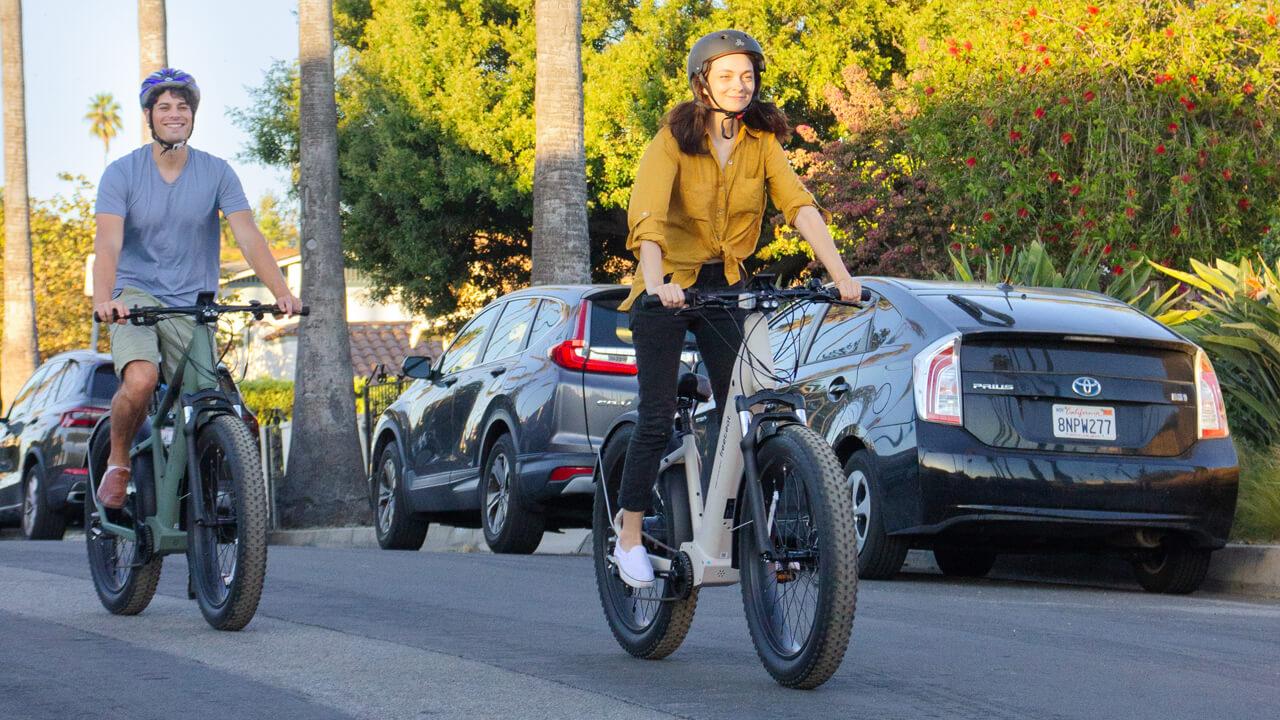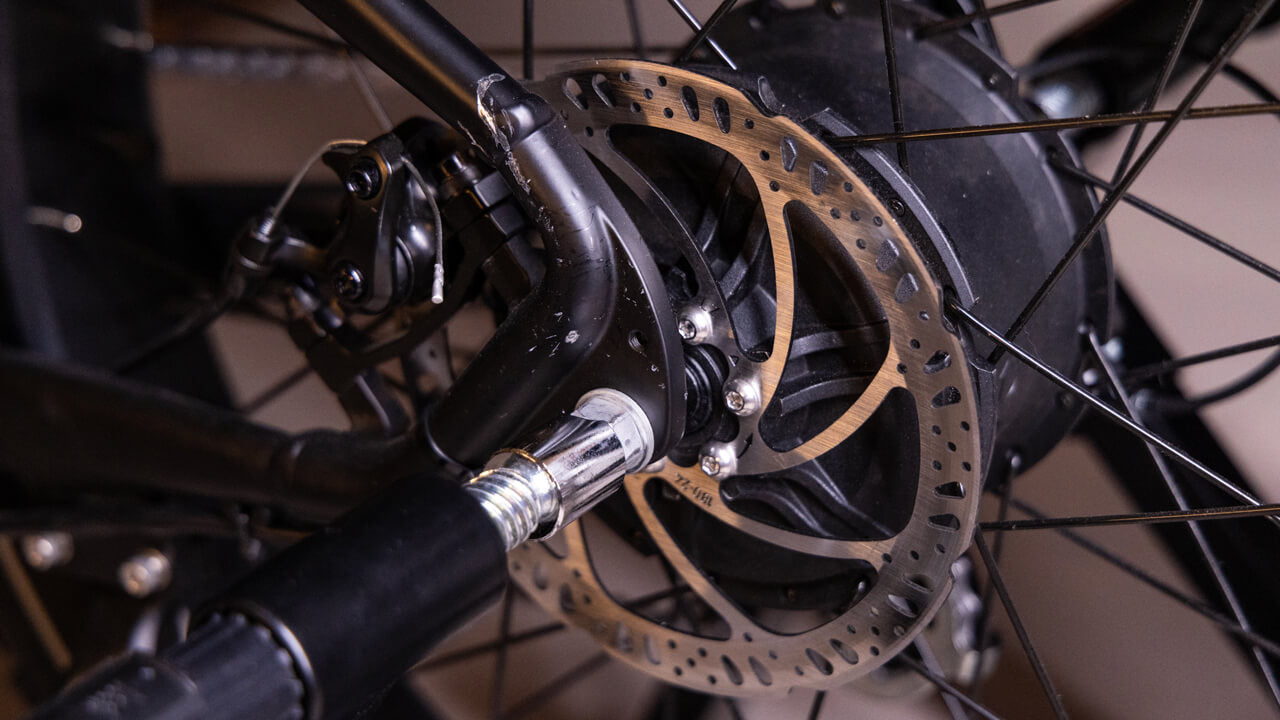Mountain Bike Brakes Showdown: Hydraulic Disc vs. Mechanical Systems

The Genesis of Disc Brakes
The Mechanical Disc Brakes in Mountain Biking
What Are Mechanical Disc Brakes?
The Pros of Mechanical Disc Brakes
-
Ease of Maintenance: With fewer parts and a cable-based mechanism, mechanical brakes are generally easier to maintain or repair in the field.
-
Cost-Effective: Often more affordable to purchase and maintain, making them an attractive option for budget-conscious riders.
-
Reliability: For some, the mechanical system's predictability and resilience in the face of adverse conditions are unbeatable.
The Cons of Mechanical Disc Brakes
-
Reduced Precision and Muscle-Braking Stress: Riders may have to exert more force and deal with increased wear on brake pads, especially on rough terrains.
-
Not as Powerful in Wet Conditions: Water or mud can collect in and around cable housing, leading to less effective braking.
-
Cable Stretch Issues: Over time, the cable may stretch, leading to a 'spongy' brake feel that requires readjustment.
The Hydraulic Herald in Mountain Biking

What are hydraulic disc brakes?
Advantages of Hydraulic Disc Brakes
-
Enhanced Performance: By design, hydraulic brakes offer superior modulation and power, allowing riders to control their braking with exceptional precision, especially in challenging downhill sections.
-
Reduced Effort: The fluid dynamics of hydraulic systems mean that less force is needed to initiate braking, which can be a game-changer, particularly on long, grueling rides.
-
Self-Adjusting: As pads wear down, hydraulic systems compensate automatically, maintaining consistent pad-to-rotor clearance without any need for manual adjustments.
Disadvantages of Hydraulic Disc Brakes
-
Complex Maintenance: Repairing or maintaining hydraulic brakes typically needs specialized tools and knowledge, making it less user-friendly for the average rider.
-
Sensitivity to Temperature: Extreme cold can thicken the brake fluid, affecting the responsiveness of the brakes. Conversely, heat can lead to brake fading.
-
Cost and Upfront Investment: Bikes with hydraulic systems tend to be more expensive, and any replacements or repairs are generally pricier.
Hydraulic vs. Mechanical Disc Brakes: Which Brakes are Best for You?
Comparing Riding Styles

Technology and Terrain

Tailoring Your Brakes to the Trail
- XC and Enduro: Mechanical brakes can be perfectly sufficient for the more evenly paced demands of cross-country and moderate enduro tracks.
- Downhill and Freeride: For disciplines that see sustained, intense braking, especially on long descents, hydraulic brakes are the overwhelming favorite for their ability to dissipate heat and manage the demands of such terrain.
- Adaptability: Some riders even opt for a combination, using a hydraulic system on the front wheel for greater stopping power and a mechanical setup on the rear for ease of maintenance.
Opt for Mechanical Disc Brakes If:
- You're a Casual Rider: For those cycling on smooth, paved surfaces and not pushing the bike to its physical limits.
- Budget is a Concern: An E-bike with mechanical disc brakes offers a more affordable entry point into the market.
- You Prefer DIY Maintenance: Tinkering with your bike is part of the thrill, and you want the ability to maintain and fix your brakes without the need for specialized tools or assistance.
Go Hydraulic If:
-
Performance is a Priority: You regularly bike off-road or in demanding terrain where precise and reliable braking is crucial.
-
You Bike Whatever the Weather: With their all-weather reliability, hydraulic brakes are the go-to choice for those who ride in wet or muddy conditions.
-
You Value Low Maintenance Systems: If you're more interested in getting out and riding than maintaining your braking system, hydraulic might be the way to go.
Considerations for the Ultimate Choice
By carefully evaluating these factors, you can make an informed decision that not only keeps you safe but also maximizes the enjoyment of every trail you tackle. Whether you're hitting the local hills or preparing for an alpine adventure, the right disc brakes can make all the difference.
-
Skill Level: Are you an MTB beginner or a seasoned professional?
-
Beginners: Starting out can be less daunting with mechanical brakes, which can provide a 'softer' learning curve for mastering bike control.
-
Advanced Riders: More seasoned riders often graduate to hydraulic brakes, appreciating the nuanced control and reduced fatigue they offer on technical courses.
-
-
Terrain: What kind of trails are you riding - steep, technical, muddy?
-
Budget: How much can you invest in your braking system?
-
Cost Considerations: Your budget might steer you towards mechanical brakes initially, but it's also worth considering future upgrades, given the performance benefits hydraulic brakes offer.
-
-
Future Upgrades: Are you looking for a system that you can build over time?
Conclusion
In the diverse world of E-bikes, there is no one-size-fits-all answer to the mechanical vs. hydraulic disc brake debate. Each system offers a unique blend of benefits and compromises, catering to distinct preferences and riding styles. What's important is making a choice that ensures your safety and enjoyment every time you hop on your E-bike.
Remember, brakes are not just about stopping – they're about control, dependability, and enhancing your overall biking experience. By understanding the nuances of each system, you can pedal with confidence, secure in the knowledge that you've made the right choice for your E-bike adventure.
Discover the All-in-One Choice for Budget-Conscious Adventurers
Looking for a mountain bike that won't break the bank but still offers Shimano hydraulic disc brakes? Look no further than the freebeat Morphrover 2 in 1 Ebike. This versatile and budget-friendly MTB comes equipped with powerful hydraulic disc brakes, providing you with exceptional control and stopping power on any terrain.

Pedaling towards a greener future takes on a whole new meaning with the Morphrover. Its 2-in-1 Smart Motor Control Algorithm converts the energy you generate during indoor rides to power your ebike, reducing your carbon footprint one pedal at a time. This is not just environmentally conscious—this technology provides you with an endless range of potential, aligning your biking activities with sustainable energy principles.
With its lightweight aluminum frame, front suspension fork, and 8-speed Shimano drivetrain, the Morphrover 2-in-1 Ebike is ready for any adventure you throw its way. Upgrade your riding experience with the freebeat Morphrover 2 In 1 Ebike and conquer any trail with ease.






















 0% APR financing for 24-month payments.
0% APR financing for 24-month payments.